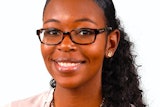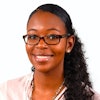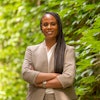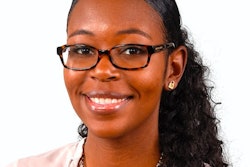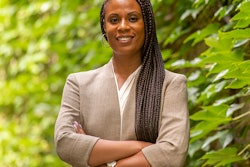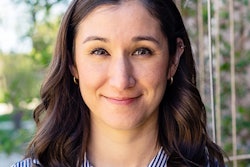Title: Assistant Professor of Applied Psychology
Tenured: No
Age: 33
Education: B.A., English and psychology, University of Virginia; M.A., child development, Tufts University; and Ph.D., educational psychology, University of Virginia
Career mentors: Black women educators (past and present); Dr. Joanna Lee Williams, Rutgers University; Dr. David Johns, NBJC; Dr. Ellen Pinderhughes, Tufts University; Angela Patton, Girls for a Change; and Eunique Jones Gibson, Because of Them, We Can
Words of wisdom/advice for new faculty members: “In the words of Wilma Rudolph, ‘never underestimate the power of dreams and the influence of the human spirit. We are all the same in this notion: The potential for greatness lives within each of us.’”
For Dr. Lauren Christine Mims, few challenges are more important in public education than creating spaces for Black students to flourish and thrive.
“I’m less interested in preparing Black children for this world if we are not also preparing the world for the Black children,” says Mims, assistant professor of applied psychology at the Steinhardt School of Culture, Education, and Human Development at New York University.
For Mims, that means dismantling biased systems that stereotype Black students as behavioral problems rather than recognize their resilience in the face of racism and tap into their innate brilliance.
Mims says the work is particularly crucial for Black girls, who are at the heart of her research agenda.
Colleagues and students hail Mims for shifting the focus away from viewing Black students, parents, and families through a deficit lens.
“Her groundbreaking work in the field of psychology is reshaping the narrative by highlighting the strengths and daily experiences of Black families and bringing a much-needed focus to the experiences of Black girls,” says Elisha Arnold, who has Mims as her graduate advisor at NYU.
Natalie H. Brito, an associate professor of applied psychology, also at NYU, shared similar observations.
“Dr. Mims is pushing the field to conceptualize Black homes as a conduit for positive growth, learning, and development by acknowledging the unique skill set and contributions Black parents provide to ensure that their children learn and thrive,” Brito says.
Much of the language that Mims uses in her research is about liberation for Black students. She espouses creative problem solving in what she refers to as “fugitive spaces,” where students discuss systems of oppression – and community strengths – as a part of the creative process.
She says the goal of her research is to help Black students to “freedom dream,” a term inspired by Freedom Dreams: The Black Radical Imagination, a 2002 book by Dr. Robin D.G. Kelley, Distinguished Professor and Gary B. Nash Endowed Chair in U.S. History at UCLA.
To get a sense of what freedom dreaming looks like in action, consider a recent visit Mims made to a middle school in Richmond, Virginia, as part of “Freedom Dreaming and Dreamkeeping with Black Girls,” a course she developed for Black middle school girls with a small grant from NYU.
“I gave them a big, huge piece of white butcher paper that goes across the table, and they just wrote all of the dreams that they had,” Mims recounts. “They wanted mental health professionals and counselors that were Black and understood what it meant to be Black. They wanted teachers to talk about Black joy in the classroom and not just Black pain or slavery. They wanted spaces where they could just see themselves and just laugh and be joyful during the school day.”
The freedom dreaming that Mims does with students began in Fairfax, Virginia, where she grew up as the daughter of a librarian mother and a lawyer father. One of her fondest memories is of getting books from the library with her family and then discussing them in the living room.
“I was able to dream out loud,” Mims recalls. “And I think these spaces that allow children to dream out loud, they’re just so important.”
Mims attributes much of her career success to the late Elijah Cummings, the longtime U.S. Congressman from Maryland. Specifically, it was a 2013 keynote speech that Cummings gave for the Black Policy Conference held at the Harvard Kennedy School’s Institute of Politics. Mims was working on her master’s degree in child development at Tufts University at the time.
“He said wherever you are, you need to be the best,” Mims recalls. That philosophy, Mims says, enabled her to go from being an intern within the White House Initiative on Educational Excellence for African Americans during the Obama Administration to becoming assistant director of the initiative.
“I wanted to be the best intern I could be,” Mims says, explaining how, when she wrote a policy memo, she would include talking points. She would also look at the director’s calendar and assign herself work to support upcoming events.
“For me it was really trying to be the best in that role,” Mims says. She knew the work paid off, she says, when others began to say: “You are an invaluable member of the team.”
